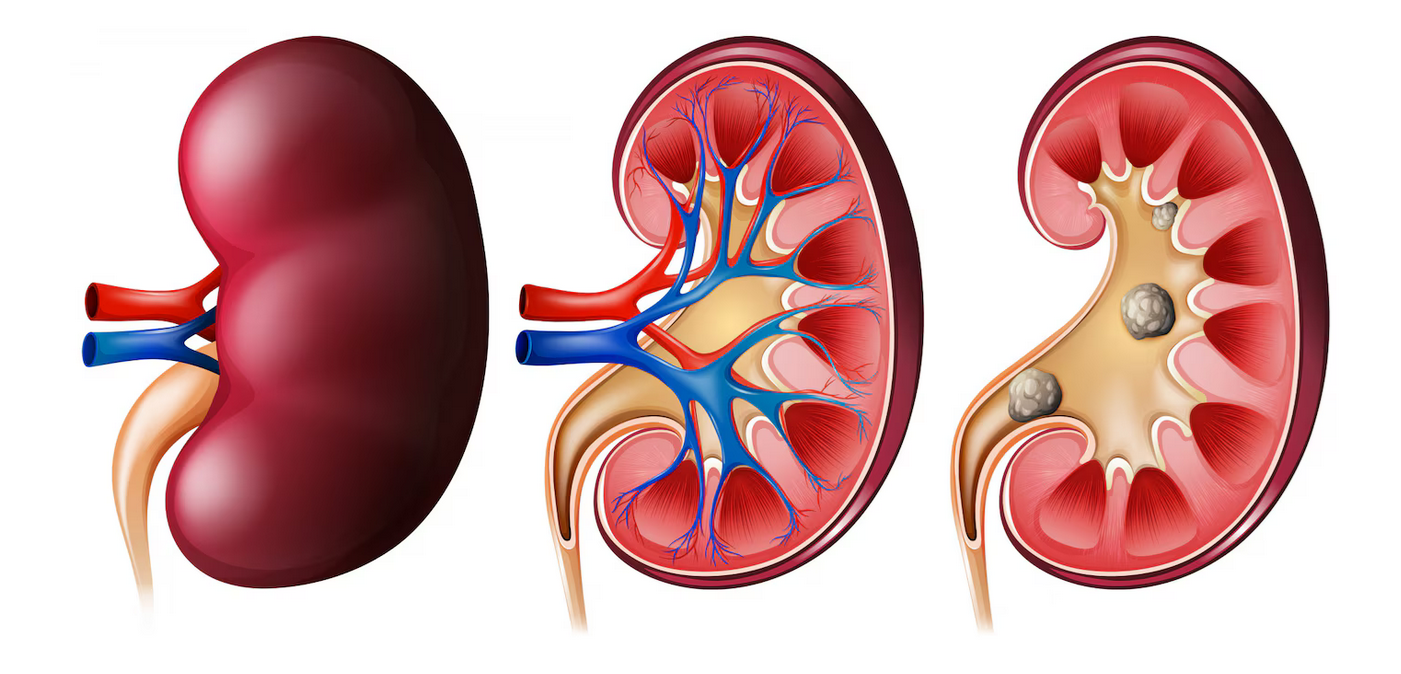Overview:
Renal calculi, commonly known as kidney stones, are hard mineral and salt deposits that form in the kidneys. These stones can vary in size and may cause severe pain when they move through the urinary tract. Common causes include dehydration, high oxalate or calcium intake, urinary tract infections, and certain metabolic disorders. Kidney stones can affect any part of the urinary tract, from kidneys to bladder.
Clinical Presentation:
Renal calculi may remain silent in the kidneys or cause excruciating pain when they pass into the ureter. The symptoms depend on the stone's size, location, and movement within the urinary system.
Common Symptoms of Renal Calculi:
- Severe flank pain: Sharp, cramping pain in the back and side, often radiating to the lower abdomen or groin
- Hematuria: Presence of blood in urine
- Frequent or painful urination: Urge to urinate often with burning sensation
- Nausea and vomiting: Often due to severe pain
- Cloudy or foul-smelling urine: Possible sign of infection
- Fever and chills: If associated with infection
- Difficulty passing urine: If the stone is obstructing the ureter
- Restlessness: Inability to find a comfortable position due to pain
- Pain during urination: Especially if the stone is near the bladder
- Decreased urine output: In severe blockage cases
Diagnosis:
Diagnosis involves imaging and lab tests to detect the presence, size, type, and location of stones and rule out complications.
- Urine Analysis: Detects crystals, infection, or blood in urine
- Ultrasound: Non-invasive method to detect stones in kidneys or bladder
- CT Scan: Most accurate for detecting even small stones and complications
- X-ray (KUB): Identifies radio-opaque stones
- Blood Tests: To check calcium, uric acid, or phosphate levels
- Stone Analysis: If passed, the stone is tested to determine its composition
Homeopathic Treatment for Renal Calculi:
Homeopathy treats renal calculi by dissolving existing stones, relieving pain, and preventing recurrence. Remedies are chosen based on the type of pain, urinary symptoms, patient history, and tendency to form stones.
Key Remedies (Selected Based on Individual Symptoms):
-
Berberis Vulgaris
-
One of the most effective remedies for left-sided kidney stones with radiating pain. Sharp, stitching pain from the kidney to the bladder with frequent urging to urinate.
-
Cantharis
-
Indicated for intense burning during urination, with anxiety and frequent, painful urging. Often used when there is bladder involvement.
-
Lycopodium Clavatum
-
Useful for right-sided kidney stones with backache and red sand in urine. Suits people with bloating and gas issues.
-
Sarsaparilla
-
Recommended when pain is more severe at the end of urination. Suits patients with gravel in the urine and thin stream of urine.
-
Hydrangea Arborescens
-
Considered the “stone breaker.” Effective in gravel-like urine with white or yellowish deposits and dull pain in the kidneys.
-
Ocimum Canum
-
Helpful for right-sided kidney stones with nausea, vomiting, and red, brick-dust sediment in urine. Urine may have a strong odor.
Note: Homeopathy strictly requires case-taking by a qualified practitioner. Remedies should not be self-prescribed.
Benefits of Homeopathic Treatment for Renal Calculi:
- Non-invasive: Helps dissolve stones without surgery
- Relieves Pain: Eases renal colic and urinary discomfort
- Prevents Recurrence: Addresses underlying causes and tendencies
- No Side Effects: Safe and gentle even for children and elderly
- Improves Kidney Function: Supports healthy urine output and filtration
- Addresses Individual Causes: Tailored to dietary, metabolic, or genetic factors
- Can Complement Allopathy: Used alongside fluids or pain relief safely


